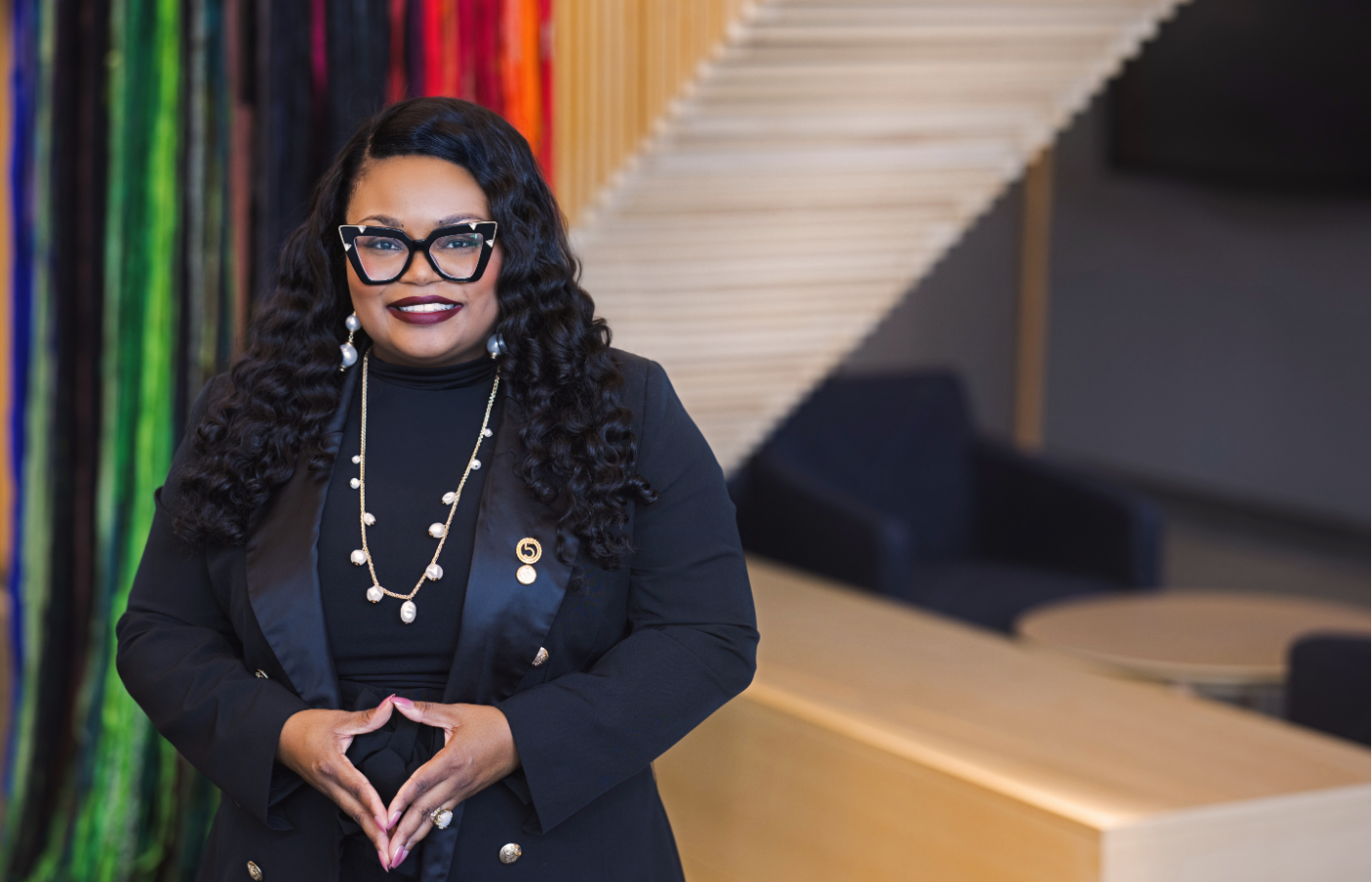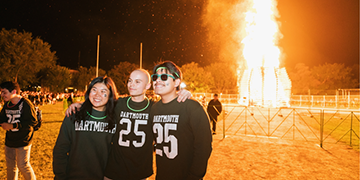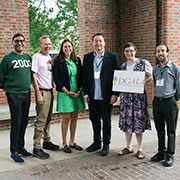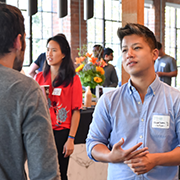Committed to Helping Students Thrive
Ansley Booker looks to grow Dartmouth NEXT and build bridges across campus.

May 28, 2025
6 minute read
James Bressor
6 minute read
Dr. Ansley Booker, the inaugural Penny and Jim Coulter 1982 Executive Director of Dartmouth NEXT, is nearing the end of her first academic year in Hanover. Booker oversees Dartmouth NEXT, a holistic strategy to expand the pipeline of students earning degrees in the sciences, technology, engineering, and mathematics. The initiative works in conjunction with the E.E. Just Program, WISP Learning & Engagement Program, Undergraduate Advising and Research scholar programs, the Learning Fellows Program, Teaching Science Fellows, and Dartmouth Emerging Engineers. It connects multiple STEM-related programs that serve undergraduates, graduates, post-baccalaureates, and post-docs students. It has been a busy year for Booker, as she has begun collaborating with partners across campus, including UGAR, the Undergraduate Deans Office, and the Guarini School of Graduate and Advanced Studies. She is also looking to expand the academic disciplines supported by Dartmouth NEXT. Her office is firmly focused on supporting undergraduates from their first contact with Dartmouth—helping prospective students understand the College’s academic support programs—through the launch of their careers.
Here, Booker reflects on Dartmouth NEXT’s mission and her plans for growing the initiative.
What is the core strength of Dartmouth NEXT?
Drawing together both well-established and new STEM programs amplifies resources, instills collaboration, fosters creativity, and nurtures innovation. This synergistic framework accelerates the development of the next generation of researchers, academics, and industry professionals ready to enter the career pipeline.
Just where does Dartmouth NEXT currently stand?
We are building out the program, bringing the ecosystem together, looking for opportunities on campus and beyond to develop partnerships. We are managing many relationships with a goal of providing resources to all students so they can thrive in an environment of academic excellence.
What are some of the major barriers to students thriving at Dartmouth?
Many students are vulnerable to lack of self-efficacy and mentorship. They often feel overwhelmed and will not ask questions during class or see a professor during office hours. They sometimes start thinking, “Well, it is my fault. My high school did not prepare me well enough. The class is moving too fast for me. I am just not good at X subject.” That sense of vulnerability, coupled with a sense of not understanding, not feeling supported can lead to a student shifting away from a math or science major. This often happens during the critical first year, when students are most likely to internalize that self-doubt. Many students often do not have mentors in their discipline or in their intended career pathway. This combination can be detrimental to retention in STEM disciplines.
How is Dartmouth NEXT addressing this?
First, with more assessment, we will learn directly from our students. We are looking to have more focused, group-based conversations with students. We will ask questions such as, “What courses are you having difficulties with? Would you like additional peer-to-peer support?” We know we cannot change anything from their high school experience. But we can look at the entire ecosystem of what Dartmouth offers and adjust the collegiate experience for everyone. We are addressing the peer-to-peer support with enhancements and expansion of programs such as Learning Fellows, Dartmouth Emerging Engineers, and Teaching Science Fellows.
When does that start?
Before their first term. I have connected with the Undergraduate Deans Office to discuss the pre-orientation experience that prepares students for the academic rigor of Dartmouth. We are looking at ways we can work with various programs to better understand incoming students’ preparation for STEM courses and research experiences. Some of these students have not had exposure to formal research or a true laboratory experience. We want to know how we can help them onboard successfully. Advising is a critical component to a successful STEM career at any institution.
Our advising model is also crucial in the success of our STEM majoring students and those that are STEM curious. Our first-year STEM students need to understand how to better navigate the D-Plan. Our goal is to equip them with transferable skills to help them balance courses successfully. The Undergraduate Deans Office provides a book called Explore, Engage, Excel to all new students. It shares advice from upper-level students, an academic planning worksheet, academic curriculum and opportunities plus recommended courses for first-year students. We are looking at how it can provide some additional academic support information.
What support is available to students in their first term?
Multiple Dartmouth NEXT-linked programs are available, including WISP, E.E. Just, and the UGAR scholar programs. One of them is the Learning Fellows Program. These are sophomores, juniors, and seniors who work in the classroom and facilitate small-group learning. They can dialogue with students, help them understand lessons and concepts, and speak with a faculty member if they notice that many students in a class are struggling with concepts. Other academic support programs include the Writing Center, Library Research Support, and the Academic Skills Center.
What is most important for first-year students?
I want to increase access and close the knowledge gap for all students. I want to make every student aware of all the resources available to them and make sure they feel comfortable utilizing these resources. It is not only supporting them in the academic sphere. We are also building a community, which helps with retention and recruitment. Being part of a community can help students who are dealing with the imposter syndrome and/or stereotype threat. They can find a sense of belonging—which incubates a growing sense of being able to succeed together.
Who else are you partnering with?
I am working with the Dartmouth for Life Office and Scholars Program Team from UGAR to build the Dartmouth NEXT Alumni Mentorship Program. The goal of the program is to connect early career STEM professionals with undergraduate members of the Coulter, Gerstner, Hanlon, and Stamps Scholars programs who are currently undertaking research in STEM.
I have connected or I am planning to connect with Geisel School of Medicine, Dartmouth Cancer Center, First-Year Summer Enrichment Program, Office of Pluralism and Leadership, Thayer, Arts & Sciences, Tuck, the Institute for Black Intellectual and Cultural Life, DALI Lab, Dartmouth Center for Career Design, local, state and national leaders in STEM pathway programs as well as Admissions. Many of our students come through programs such as the Indigenous Fly-In program, Dartmouth Bound, and Quest Bridge. We want to work with these programs to help select outstanding students and make them aware of Dartmouth NEXT programs.
My newest connection is to build K-12 STEM pathway programs with SPARK Dartmouth, Dartmouth Alliance for Children of Color, EDGE Consortium, FIRST Robotics, and the Montshire Museum of Science.
Are you looking to expand the scope of Dartmouth NEXT?
I am working to incorporate medicine, robotics, humanities, and the arts. This also includes developing more programs for student-based research. That is an area where Dartmouth is a leader. Many undergraduates are actively engaged in research by the start of their second year. WISP and our scholar programs offer research funding, and we would like to make that more widely available. By nurturing critical thinking, encouraging independent exploration, and building resilience, early research participation equips students with the skills and mindset necessary for success in their academic and professional endeavors. Students can share their research annually at the Wettherhahn Science Symposium (taking place this year on May 27) and quarterly at the DALI Lab’s Technigala (next scheduled for June 4).
How does art fit with Dartmouth NEXT’s mission?
I want to take an interdisciplinary approach and focus on opportunities of collaboration utilizing the STEAMM acronym. We can explore how art, culture, science, math, technology, medicine, and engineering intersect. We have some amazing artists at all levels exploring various mediums on this campus conducting thought-provoking research in the arts. This collaborative approach is another way to expand students’ capacity to think more broadly about career design and academic engagement.
Is Dartmouth NEXT possibly a model for other universities?
If we can demonstrate success with increased retention rates across all demographics coupled with a successful transition into the job market, then we would have something here. Universities everywhere are dealing with the issue of “the missing millions”—that is the term that the National Science Foundation uses for the millions of college students do not pursue degrees in STEM career fields. If we can figure out how to close this gap and provide replicable policies, strategies, and guidelines, then we could be a national model. We are already headed in the right direction. Almost 10 years ago, Dartmouth became the first national research university to award more undergraduate degrees to women than men in engineering. Thayer College of Engineering granted 52% of its undergraduate engineering degrees to women in 2016.






